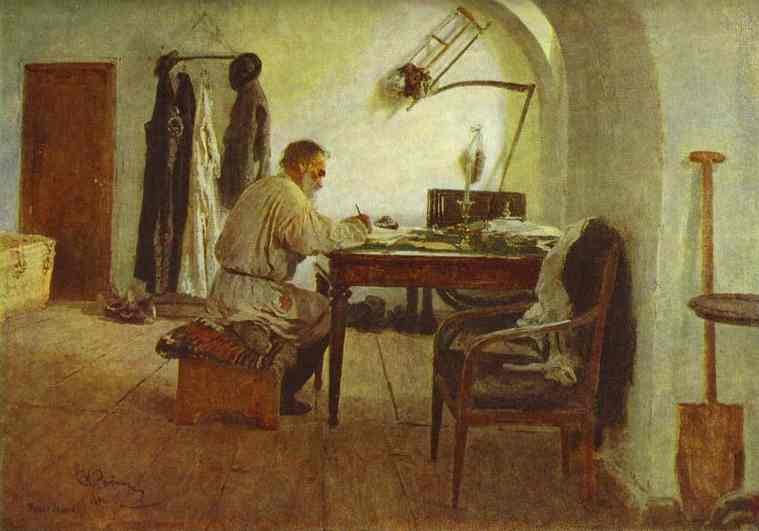Tolstoy: ‘Change humanity? Change yourself.’
As we mark the 194th anniversary of Leo Tolstoy’s birth, let’s mark the world’s greatest fiction writer by getting off each other’s backs
In Three Methods of Reform, Leo Tolstoy wrote, “Everybody thinks of changing humanity, and nobody thinks of changing himself.” This quote by the world’s greatest writer, born September 9, 1828, speaks to the culture of animosity that has divided America since the first Trump presidential campaign. Tolstoy’s story can illuminate how we arrived at such an unending avalanche of misinformation and blame—and help us emerge from it.
If Tolstoy had lived in 2020, he may have been initially tormented by and vocal about the uncertainties surrounding COVID. Would he have taken up his pen to share his less-than-fully informed thoughts? Perhaps. After all, it’s how he got his start as a writer.
In his memoir, A Confession, he told of his deep need to understand what motivates writers to write, admitting that, early on, he shared the shallower traits of many people with opinions and a means to communicate them: vanity, pride and a desire for fame and fortune. He witnessed others of his time achieving pecuniary success and notoriety from writing down and sharing whatever came into their head regardless of consequences, so he soon made it work for him, too.
To succeed, Tolstoy said, “It was necessary to hide the good and to display the evil. ... And I did ... and was praised.”
The more such people wrote, he said, the more they believed their misinformation. Their volubility grew into what he called “an insane assurance” that it was their duty to teach people even if they didn’t know what they were talking about.
“We were all then convinced that it was necessary for us to speak, write and print as quickly as possible and as much as possible ... without noticing that we knew nothing.” - Tolstoy
Social media and broadcast news didn’t exist in the late 1800s, but his description of how some people spread their views eerily echoes today’s social and news spaces. Even as they talked over one another, they praised each other to get praise themselves.
Tolstoy eventually became so concerned over the dangers of spreading inaccurate information that he gave up the “fame and fortune” and quit. He wanted to limit the damage as best he could. In his day, one published writer dropping out of high-profile social debate might or might not have been noticed; the printing press had been around for only 400 years, and the spread of ideas was more like molasses than like water from a fire hose as it is today.
Today, almost anyone with Internet access can become a writer, an influencer, an “expert” with a few followers unwilling to question their integrity. Bad information spreads much faster than good. A statement that flies in the face of logic and evidence can (and does) zip around the world through millions of living rooms in hours, bolstered by people’s need to justify what they support and repeat. In studying Tolstoy’s criticism of the Great Man Theory,[1] Nicolaas Mouton of Roskilde University, Denmark, said, “It is not the leader who magnetizes the followers, but the followers who make the leader; what matters is not what he does, but what they say about what he does. The few Great Men are talked into Greatness by their many little followers.”[2]
Thus, “writers” continue, with “insane assurance,” to push unsubstantiated information from “Great Men” (and Women) as fact out into the world as if it is their duty. Even when they don’t know what they’re talking about.
If only they’d take a leaf out of Tolstoy’s writings and limit the damage by withdrawing from the conversation. As he wrote in What Then Must We Do? “I sit on a man’s back, choking him and making him carry me, and yet assure others that I am very sorry for him and wish to ease his lot by all possible means—except by getting off his back.”
Let’s get off each other’s backs. The best way to help someone is to know what we’re talking about before we speak.
[1] The Great Man Theory posits that leaders aren’t made, they’re born.
[2] Mouton, N. (2019). “A literary perspective on the limits of leadership: Tolstoy’s critique of the great man theory.” Leadership, 15(1), 81–102. https://doi.org/10.1177/1742715017738823
Image:
Ilya Repin. “Leo Tolstoy in His Study.” 1891. Oil on canvas. The State Literature Museum, Moscow, Russia. Used under Creative Commons license: Attribution-ShareAlike 2.0 Generic (CC BY-SA 2.0)



